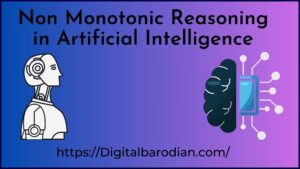
Artificial Intelligence (AI) has made remarkable progress in emulating human-like intelligence, enabling machines to perform tasks that require reasoning, problem-solving, and decision-making. One essential facet of AI reasoning, especially in complex and dynamic environments, is non-monotonic reasoning. In this article, we’ll explore what non monotonic reasoning in artificial intelligence is, how it operates, and its significance in the field of artificial intelligence.
What is Non Monotonic Reasoning in Artificial Intelligence?
Non monotonic reasoning is a type of logic used in AI to handle situations where conclusions drawn may need to be revised or updated in the light of new information. Unlike classical or monotonic reasoning, which assumes that new information only adds to the existing knowledge and never contradicts it, non-monotonic reasoning acknowledges that new information can lead to revisions or even retraction of previously drawn conclusions.
In everyday terms, non-monotonic reasoning reflects how humans often form tentative beliefs and conclusions based on available evidence, but are willing to adjust those beliefs when presented with new, contradictory, or more reliable information.
Key Characteristics of Non Monotonic Reasoning in Artificial Intelligence
To better understand non monotonic reasoning in artificial intelligence, consider the following key characteristics:
1. Tentative Conclusions:
In non-monotonic reasoning, conclusions are not treated as absolute truths but as tentative beliefs that can change when additional information becomes available.
2. Open-World Assumption:
Non-monotonic reasoning often operates under the open-world assumption, which means that conclusions are drawn based on the currently available evidence, without assuming that all relevant information is known.
3. Revisable Knowledge:
Knowledge in non-monotonic reasoning is revisable. When new data conflicts with existing beliefs or conclusions, the system can revise its knowledge base without causing logical inconsistency.
4. Default and Defeasible Reasoning:
Non-monotonic reasoning employs default and defeasible reasoning mechanisms, allowing it to make assumptions based on defaults but remain open to the possibility of exceptions.
Applications of Non Monotonic Reasoning in Artificial Intelligence
Non monotonic reasoning in artificial intelligence has a wide range of practical applications in AI and beyond:
1. Expert Systems:
Expert systems, which provide expert-level advice or recommendations in specific domains, often rely on non-monotonic reasoning. These systems can draw tentative conclusions and update their recommendations as more information becomes available.
2. Legal Reasoning:
In the field of law, non-monotonic reasoning is used to model legal reasoning and argumentation. Legal systems often involve conditional rules and exceptions, making non-monotonic reasoning a suitable framework.
3. Cognitive Computing:
Cognitive computing systems, designed to mimic human thinking, use non-monotonic reasoning to form and adjust beliefs as they process new information.
4. Common Sense Reasoning:
Non-monotonic reasoning is essential for common sense reasoning in AI. It allows AI systems to handle situations where common sense knowledge may override strict logical inference.
Challenges and Future Developments
While non monotonic reasoning is a valuable tool in AI, it faces challenges:
- Complexity: Handling complex knowledge revisions and reasoning processes can be computationally intensive, making real-time decision-making a challenge.
- Interpretability: Explaining why a particular conclusion was reached or revised can be challenging, especially in systems with intricate knowledge bases.
- Knowledge Acquisition: Obtaining and maintaining the necessary background knowledge for non-monotonic reasoning systems can be a significant hurdle.
The future of non monotonic reasoning in AI is likely to involve:
- Advanced Learning Techniques: Integrating machine learning with non-monotonic reasoning to make AI systems more adaptive and context-aware.
- Cognitive Systems: Developing AI systems that can better emulate human-like reasoning and adapt to dynamic environments.
- Interdisciplinary Applications: Expanding the use of non-monotonic reasoning to address complex problems across various domains, including healthcare, finance, and scientific research.
Conclusion
In conclusion, Non monotonic reasoning in artificial intelligence is a critical component of AI that allows systems to reason in uncertain and dynamic environments, mirroring how humans adapt their beliefs in light of new information. As AI continues to advance, the role of non-monotonic reasoning will expand, contributing to the development of more intelligent and adaptable AI systems.
- Reasoning in Artificial Intelligence
- Learning Agents in AI
- Problem Solving Agents in AI
- Types of Intelligent Agents in AI
- Structure of Agents in AI
- Knowledge Based Agents in AI
- Agents in AI
- Scope of AI
- Artificial Intelligence in Healthcare
- Free AI Essay Writers
- AI Essay Writers
- Examples of AI
- Types of Artificial Intelligence
- Application of AI
- What Is AI Art?
- What Is AI?
- Online Free AI Story Generator
- AI Story Generators with Tools
- Character AI
- Beta Character AI
- AI Voice Generator Tools
- Top 50 Best Free AI Tools
